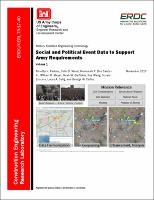Please use this identifier to cite or link to this item:
https://hdl.handle.net/11681/25702Full metadata record
| DC Field | Value | Language |
|---|---|---|
| dc.contributor.author | Perkins, Timothy K. | - |
| dc.contributor.author | Wood, Colin D. | - |
| dc.contributor.author | Dos Santos, Raimundo F. | - |
| dc.contributor.author | Meyer, William D. | - |
| dc.contributor.author | Garfinkle, Noah W. | - |
| dc.contributor.author | Enscore, Susan I. | - |
| dc.contributor.author | Selig, Lucas A. | - |
| dc.contributor.author | Calfas, George W. | - |
| dc.contributor.author | Wang, Xue | - |
| dc.date.accessioned | 2017-12-01T18:43:35Z | - |
| dc.date.available | 2017-12-01T18:43:35Z | - |
| dc.date.issued | 2017-11 | - |
| dc.identifier.uri | http://hdl.handle.net/11681/25702 | - |
| dc.identifier.uri | http://dx.doi.org/10.21079/11681/25702 | - |
| dc.description.abstract | Military success requires applying judgement and decision making in a high-tempo atmosphere, based on available information. Geographic data at the city level is not enough spatial fidelity for tactical-level analyses. Violent Events Socio-Cultural Analysis (VESCA) work enables an analyst to evaluate and integrate multiple data sources, work with enhanced event data spatial resolution, and analyze and/or visualize the data to produce mission-relevant information. Hand-coded datasets can be more precise, but they require added time and labor to produce, have a significant lag between last observation and present day, are produced with varying schemas, and often duplicate events across datasets. This report includes back-ground regarding event data sources; study of protests, demonstrations, and rallies; and relevant analytical methods. It describes doctrine regarding civil considerations, sociocultural analysis, and contingency basing to present how event data can be transformed from its original form and interpreted to support doctrinal analysis. The report also describes enhancing event data through geoparsing and through harmonization processes and tools to align datasets to a common schema and identify duplicate entries. Finally, the report presents how data may be analyzed and processed for mission-relevant results. The VESCA team’s work yielded an event data harmonization prototype and recommendations for refinement. | en_US |
| dc.description.sponsorship | United States. Office of the Assistant Secretary of the Army for Acquisition, Logistics, and Technology. | en_US |
| dc.description.sponsorship | Geospatial Research Laboratory (U.S.) | - |
| dc.language.iso | en | en_US |
| dc.publisher | Construction Engineering Research Laboratory (U.S.) | en_US |
| dc.publisher | Engineer Research and Development Center (U.S.) | en_US |
| dc.relation.ispartofseries | ERDC/CERL;TR-17-40 Volume 1 | - |
| dc.subject | Geospatial data | en_US |
| dc.subject | Geographic information systems | en_US |
| dc.subject | Cities and towns | en_US |
| dc.subject | Situational awareness | en_US |
| dc.subject | Military planning | en_US |
| dc.subject | Military bases | en_US |
| dc.subject | Violent Events Socio-Cultural Analysis (VESCA) | en_US |
| dc.title | Social and political event data to support Army requirements : volume 1 | en_US |
| dc.type | Report | en_US |
| Appears in Collections: | Technical Report | |
Files in This Item:
| File | Description | Size | Format | |
|---|---|---|---|---|
| ERDC-CERL TR-17-40 Volume 1.pdf | 3.64 MB | Adobe PDF |  View/Open |